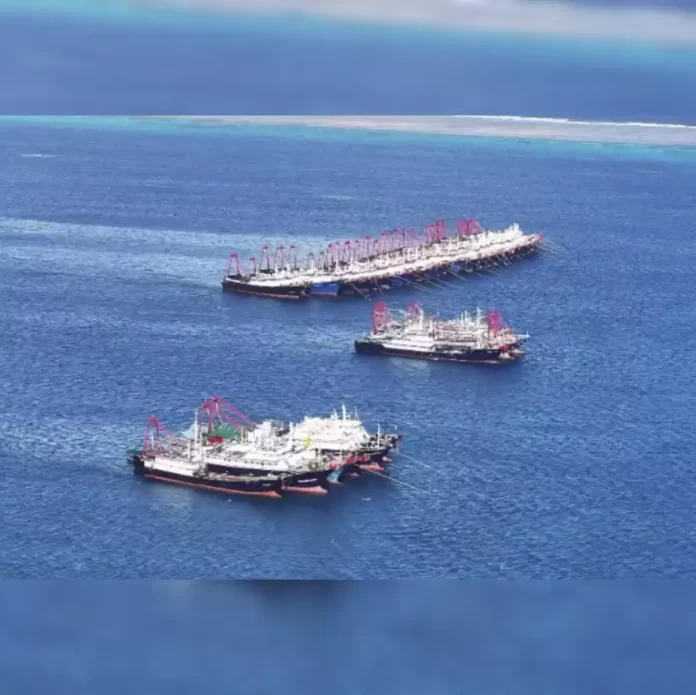The Philippines has voiced concerns over China’s recent actions in the South China Sea, describing them as ‘dangerous’ and a threat to regional stability. The escalating tensions in the disputed waters have reignited longstanding territorial disputes and raised fears of potential conflict.
In a recent statement, Philippine officials condemned China’s increasing militarization of the South China Sea, including the construction of artificial islands and the deployment of military assets in the region. These actions have raised alarm bells among neighboring countries, who view them as a challenge to their sovereignty and territorial integrity.
The Philippines, along with other Southeast Asian nations, has consistently called for a peaceful resolution to the South China Sea disputes based on international law, including the United Nations Convention on the Law of the Sea (UNCLOS). However, China’s assertive behavior has complicated efforts to find a diplomatic solution to the long-standing territorial disputes.
The South China Sea is a strategically important waterway through which trillions of dollars in trade pass each year. It is also rich in natural resources, including oil and gas reserves, making it a highly contested area among neighboring countries.
In recent years, China has undertaken extensive land reclamation and construction activities in the South China Sea, transforming previously submerged reefs and rocks into military outposts equipped with airstrips, radar systems, and missile installations. These actions have drawn criticism from the international community and heightened tensions in the region.
The Philippines, as one of the claimant states in the South China Sea disputes, has sought to assert its rights and interests through diplomatic means while also strengthening its defense capabilities. The country has pursued closer security cooperation with traditional allies such as the United States and expanded its maritime patrols in the disputed waters.
Despite diplomatic efforts to ease tensions, incidents of maritime harassment and close encounters between Philippine and Chinese vessels have continued to occur, raising concerns about the risk of miscalculation or unintended escalation. These incidents underscore the volatile nature of the situation in the South China Sea and the need for continued vigilance and diplomatic engagement.
In response to China’s actions, the Philippines has called for a unified approach among Southeast Asian nations to address the challenges posed by Beijing’s assertiveness in the region. The country has also sought to strengthen its ties with like-minded partners and allies who share its concerns about China’s growing influence and assertive behavior.
Moving forward, the Philippines remains committed to upholding the rule of law and promoting peace and stability in the South China Sea. The country continues to advocate for a rules-based approach to resolving disputes and calls on all parties to exercise restraint and respect international norms and agreements.
Amid rising tensions, the Philippines has reiterated its commitment to multilateral mechanisms such as the Association of Southeast Asian Nations (ASEAN) to address the South China Sea disputes. However, efforts to reach a consensus among ASEAN members on a unified approach to the issue have been hampered by differences in geopolitical interests and China’s growing influence in the region.
The Philippines has also sought to strengthen its maritime domain awareness and surveillance capabilities to better monitor and respond to potential security threats in the South China Sea. This includes the modernization of its naval fleet and the enhancement of maritime patrols and reconnaissance activities.
In addition to diplomatic and security measures, the Philippines has emphasized the importance of engaging with China through dialogue and confidence-building measures to reduce tensions and promote mutual trust. However, progress on such initiatives has been slow, with both sides remaining entrenched in their respective positions.
The Philippines’ stance on China’s actions in the South China Sea has received support from the international community, including the United States, Japan, and European nations, who have expressed solidarity with Southeast Asian countries in upholding freedom of navigation and respect for international law in the region.
Despite the challenges posed by China’s assertiveness, the Philippines remains committed to pursuing a peaceful and rules-based resolution to the South China Sea disputes. The country advocates for the full and effective implementation of the 2016 arbitral ruling, which invalidated China’s expansive maritime claims in the South China Sea and affirmed the Philippines’ sovereign rights over its exclusive economic zone.
Looking ahead, the Philippines seeks to strengthen regional cooperation and build consensus among ASEAN members on a common approach to addressing the South China Sea disputes. This includes promoting dialogue, confidence-building measures, and the peaceful resolution of conflicts through legal and diplomatic means.
Also, the Philippines’ concerns over China’s ‘dangerous’ actions in the South China Sea reflect the complex geopolitical dynamics and security challenges facing the region. As tensions continue to escalate, the Philippines remains steadfast in its commitment to upholding the rule of law, promoting peace and stability, and safeguarding its sovereignty and territorial integrity in the disputed waters.

